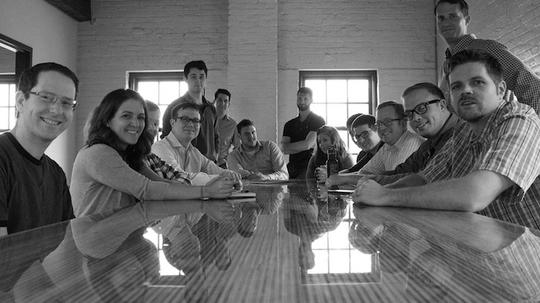
Understandably so, it's pretty easy for people to gain access to medical records in hospitals. Various physicians, nurses and, sometimes, medical students need to be able to easily update a patients' record every time they treat them.
But, on the flip side, it's pretty easy for outside hackers to gain access, too, as seen in the May WannaCry ransomware attacks that targeted 16 hospitals in the England as part of its hacks.
That's where Baltimore-based startup Protenus comes in.
Founded by two Johns Hopkins University alumni, Protenus is part-health tech startup, part-cybersecurity company. Aimed at protecting data for healthcare providers, the startup tracks the activity of those who usually update a patients' medical records — physicians, nurses, medical students — and creates a profile. If anything pops up that's out of the usual, Protenus' systems alert the appropriate parties.
"As medical students, we could just go in and edit those records, and that creates a real problem for healthcare because you have to give people more access and assume that they are doing it to help the patient," said co-founder Nick Culbertson in an interview. "But, at the same time, it really depends on the individual to follow through on that in the industry."
Culbertson and fellow co-founder Robert Lord met while in medical school at Johns Hopkins when they stumbled upon this idea in 2013. Officially, they launched Protenus in 2014 — the same year they participated in the DreamIt Health Baltimore accelerator program.
Protenus, which also presented at the Northern Virginia Tech Council's Capital Health Tech Summit in June, have partnered with more than 150 hospitals, including Planned Parenthood clinics, Johns Hopkins University hospital system, Duke University health system, Inova Health System and Yale New Haven Health.
Culbertson and Lord plan to focus on expanding to more academic hospital systems, like Johns Hopkins, Duke and Yale's systems.
"The workflow is more nuanced at research medical systems because you have research teams and teaching teams working at different workflows," Culbertson said. "It helps us scale the size and the complexity of our systems."
“There is a tremendous amount of life science and tech talent in the region.”
As for being in Baltimore, it just makes sense, the two co-founders said. They're looking to continuously attract both top healthcare and cybersecurity talent to their 30-person team. "There is a tremendous amount of life science and tech talent in the region," Lord said in an interview. "There is a really robust landscape in how you recruit talent whether that’s in cost of living or benefits."
For now, the two co-founders just have to figure out their growing challenge of meeting demand for the product and making sure they have the tech to support their growing data bed.
They brought in a $4 million Series A round in February 2016 to support their sales and marketing efforts, and the two co-founders said they're also planning their next round of funding.
"One of the things that we’ve found to be invaluable is asking for advice," Culbertson said. "We couldn't have gotten as far as we have if we had not reached out to experts."




